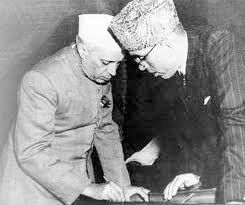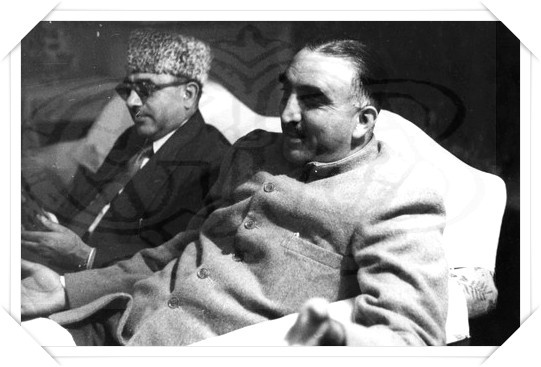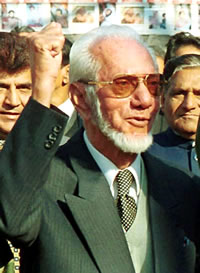Peace Watch » Editor's Take » Tribesmen and Kashmir narrartive
Tribesmen and Kashmir narrartive
Z.G. Muhammad
Many stories about 1947 happenings in Kashmir have remained untold. The reason has not been that there were no historians or scribes around to record them but for fear of reprisal by what one would call as ‘neo-fascists’ rulers many dared not to record the happenings as they happened. Those that dared to violate the dictates were exiled or deported to AJK. It was denounced as “gangster rule” by Mehr Chand Mahajan in his letter of December 11, 1947 to Sardar Patel he wrote “large number of people are confined to jails, without enquiry, trial or orders, it is worst than an autocratic country were rules are made by one person.” 
In fact, many Western historians right from Josef Korbel to Alistair Lamb have immensely contributed to Kashmir narrative and told many untold stories. In nineties when Lamb published three exhaustive books on Kashmir challenging the ‘dominant’, discourse on the “instrument of accession”, “presence of “foreign troops” in Kashmir before October 27 and Sheikh Abdullah’s role after his release on September 29, these ruffled some feathers in Delhi. Christopher Snedden’s in his recently released book Kashmir: the Unwritten History challenging the landing of troops in Srinagar on October 27 1947 because of tribesmen invading the state on October 24 not only strengthens Lambs narrative but also calls for greater debate in academic circles.
The Snedden’s book took Kashmir media by a storm and caused some visible ripples in New Delhi. In Greater Kashmir March 7, 2013, one writer “piqued” by the author challenging the “white paper” story of Kashmir problem raised some points. One, Pakistan leaders did not meet Kashmir leaders to thrash out the terms of accession. Two, the rebellion in Poonch was “local” that did not go beyond its borders. Three, Questioned the wisdom of the tribesmen in choosing the Jhelum Valley route for entering into the State instead of Suchet Garh that in her opinion would have helped in severing of Kashmir from rest of India. Moreover, suggests that tribesmen were looters, and these were not moved by the “atrocities” committed against the Muslims in Jammu. Before coming to the points raised in the article and analyzing them dispassionately in right historical perspective there is, need to know the demographic and geographical complexion of the state before October 27, 1947. Moreover, how ignoring these harder realties contributed towards the birth of ‘Kashmir tragedy.’  The census of 1931 puts total area of Jammu and Kashmir as 218,780 Sq.kms, Jammu province occupied an area of 32067 Sq km, Kashmir Province that included Muzzaffarabad 22,165 Sq km and Frontier region of Ladakh and Gilgit 1,64604.86 Sq Km. The total population of the State in 1941 was 40,21,616. The population of Kashmir was 17,28,705, Jammu, 19,81,433 and of Frontier District 3,11,478. “In terms of religious affiliations according to the 1941 census the percentage of Muslims in the population was 93.45 percent in Kashmir valley, 61.35 percent in Jammu and 86.7 percent in Frontier region.”
The census of 1931 puts total area of Jammu and Kashmir as 218,780 Sq.kms, Jammu province occupied an area of 32067 Sq km, Kashmir Province that included Muzzaffarabad 22,165 Sq km and Frontier region of Ladakh and Gilgit 1,64604.86 Sq Km. The total population of the State in 1941 was 40,21,616. The population of Kashmir was 17,28,705, Jammu, 19,81,433 and of Frontier District 3,11,478. “In terms of religious affiliations according to the 1941 census the percentage of Muslims in the population was 93.45 percent in Kashmir valley, 61.35 percent in Jammu and 86.7 percent in Frontier region.”
Here based on demographic complexion of the state, I am not to reiterate a point that has been made by so many historians: the state being overwhelmingly Muslim majority with its seventy to eighty percent borders contiguous to Pakistan as a natural corollary should have been part of Pakistan. ‘Even Nehru’s own high commissioner to Pakistan Sri Prakasa admitted to Mountbatten that for sake of peace all round, the best thing India could do was hand over Kashmir to Pakistan.’ One of world’s top most historian and biographer all major leaders of India and Pakistan including Gandhi, Nehru and Jinnah Stanly Wolpert believing that Kashmir had affected Nehru’s political and diplomatic vision writes, ‘Nehru warned Sheikh Abdullah not to think of going to Pakistan to meet Jinnah. “Any direct contact should be avoided” ….Nehru and Patel believed that war over Kashmir would swiftly bankrupt Pakistan.’ (Shameful Flight Page 187-189). Nehru was aware Sheikh Abdullah had received an invitation from M.A. Jinnah to visit Karachi for working out modalities of relations of the State with Pakistan. Sheikh Abdullah in his autobiography mentions only two names M.D. Taseer and Sheikh Sadiq, old Kashmiris settled in Lahore coming as Jinnah’s envoys and inviting him to Karachi. Sheikh makes no mention of other members of delegations including one time Nehru’s right hand in undivided Punjab Mian Iftikhar-u-Din, who in 1946 had joined Muslim League informing him that Jinnah was open-minded on the type of relations Kashmir wants to have with Pakistan and he nursed no personal grouse against him. Sheikh Abdullah chose G.M. Sadiq to visit Pakistan. In an interview with Rasheed Taseer Sadiq shared full details about his successful meetings with Pakistan leaders including Pakistan Prime Minister Liquate Ali Khan. When Sadiq was in Lahore Sheikh Abdullah was personal guest of Nehru in 17- York Street now called Teen Muri House. Sheikh was obliged to Nehru for getting him released from Jail through Patel. The letter of Nehru to Patel in September – now public after publication of Patel Correspondence makes amply clear the objective behind getting Sheikh released from Jail. Not only did Nehru ensure Abdullah’s release from jail but also made efforts to keep him in good mood. Sheikh Abdullah in his autobiography writes that Jawaharlal Nehru did not mind for protocol and received me at airport personally. A guard of honor was presented to me on arrival and I housed in Prime Minister House as personal guest. ( Page 396).  Nehru called his daughter Indira Gandhi from Lucknow, writes author of Nehru’s biography M.J. Akbar, “Nehru summoned his daughter from Lucknow to improve the kitchen as the Sheikh’s love for good food was famous.’ After his return from Lahore went straight to Delhi to apprise Sheikh Abdullah about his talks with Pakistan. Sadiq told Rashid Taseer, he talked to Sheikh Abdullah in Kashmiri about talks and informed him that he has also got a letter for him from there. Sheikh talked in Urdu and asked me for letter which I handed over to him. Sheikh in turn handed over this letter to Nehru. Nehru advised Sheikh against visit Pakistan. Nehru becoming more conscious about Kashmir. (Tahreek Hurriyat Kashmir vol 3). Jinnah as against Nehru in his speech of 17 June 1947 was open minded on relations of the state with Pakistan. After lapse of paramoutcy he had state that the states would be free to join constituent assembly India or Pakistan or remain independent. Congress Work committee as against this he had ruled out option of independence for the states. “Even Jinnah said on 11 July 1947, “If Jammu and Kashmir opted for Independence, Pakistan would welcome it.” (Across LOC by Luv Puri Penguin India Page 20). It is pertinent, all these development have taken place before October 24, 1947- the date when tribesmen joined the Poonch rebellion.
Nehru called his daughter Indira Gandhi from Lucknow, writes author of Nehru’s biography M.J. Akbar, “Nehru summoned his daughter from Lucknow to improve the kitchen as the Sheikh’s love for good food was famous.’ After his return from Lahore went straight to Delhi to apprise Sheikh Abdullah about his talks with Pakistan. Sadiq told Rashid Taseer, he talked to Sheikh Abdullah in Kashmiri about talks and informed him that he has also got a letter for him from there. Sheikh talked in Urdu and asked me for letter which I handed over to him. Sheikh in turn handed over this letter to Nehru. Nehru advised Sheikh against visit Pakistan. Nehru becoming more conscious about Kashmir. (Tahreek Hurriyat Kashmir vol 3). Jinnah as against Nehru in his speech of 17 June 1947 was open minded on relations of the state with Pakistan. After lapse of paramoutcy he had state that the states would be free to join constituent assembly India or Pakistan or remain independent. Congress Work committee as against this he had ruled out option of independence for the states. “Even Jinnah said on 11 July 1947, “If Jammu and Kashmir opted for Independence, Pakistan would welcome it.” (Across LOC by Luv Puri Penguin India Page 20). It is pertinent, all these development have taken place before October 24, 1947- the date when tribesmen joined the Poonch rebellion.
Armed Poonch rebellion, as can be made from the figures about areas quoted above for having brought within its ambit more than half of the state. Truly, Kashmir valley that comprised about one eight of the total area was not directly affected by the armed rebellion against the Maharaja. More than fifty thousand were up in arms. “And only 2000 tribesmen had joined them as India mentioned in its original complaint against Pakistan to UNSC on 1 January 1948”. It seems unimaginable that massacre of Muslims in Jammu would not caused reaction in the NWFP bordering Jammu province. Ian Stephens in his book Horned Moon provides a deeper insight into the drama of death enacted in Jammu. “In Jammu district alone” writes Luv Puri the ‘percentage of Muslims was reduced from 37 percent to 10 percent.’ This drama of death continued even when Sheikh Abdullah on 30 October 1947 took over as Chief Administrator of J&K with absolute powers. In Jammu province, Abdullah and the National Conference had no support. Hindus supported Maha Sabha and Muslims were overwhelmingly supporters of the Muslim Conference. Puri writes Abdullah’s interim government ‘in year 1947-1948 was confined’ to Srinagar only-He could not prevent the massacre of Jammu Muslims.”
True, there gaps in contemporary Kashmir, the developments during 1947- 47 are well documented and these cannot be contorted to wishes and fancies of individuals.
Filed under: Editor's Take · Tags: Abdullah, Christopher Snedden, Tribal raid in Kashmir, Z. G. muhammad, Zahid G Muhmmad







